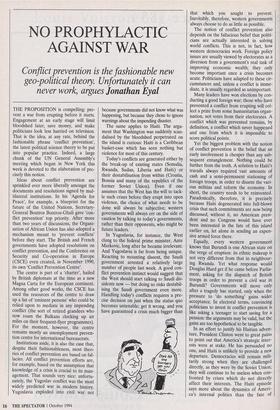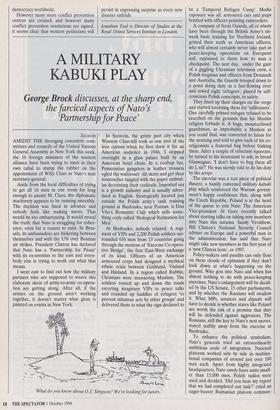NO PROPHYLACTIC AGAINST WAR
Conflict prevention is the fashionable new geopolitical theory. Unfortunately it can
never work, argues Jonathan Eyal THE PROPOSITION is compelling: pre- vent a war from erupting before it starts. Engagement at an early stage will limit bloodshed later, save money, and make politicians look less harried on television. That is the idea, at any rate, behind the fashionable phrase 'conflict prevention', the latest political science theory to be put into popular practice. Indeed, a large chunk of the UN General Assembly's meeting which began in New York this week is devoted to the elaboration of pre- cisely this notion.
Ideas about conflict prevention are sprinkled ever more liberally amongst the documents and resolutions signed by mul- tilateral institutions. In his 'Agenda for Peace', for example, a blueprint for the future of the United Nations, Secretary- General Boutros Boutros-Ghali gave 'con- flict prevention' top priority. After more than two years of discussions, the Organi- sation of African Union has also adopted a mechanism meant to 'prevent conflicts' before they start. The British and French governments have adopted resolutions on conflict prevention, and the Conference on Security and Co-operation in Europe (CSCE) even created, in November 1990, its own 'Conflict Prevention Centre'.
The centre is part of a 'charter', hailed by British diplomats at the time as a new Magna Carta for the European continent. Among other good works, the CSCE has used the resources of the centre to draw up a list of 'eminent persons' who could be relied upon to mediate in any impending conflict (the sort of retired grandees who now roam the Balkans clocking up air miles on their frequent-flyer programmes). For the moment, however, the centre remains mostly an unemployment preven- tion centre for international bureaucrats.
Institutions aside, it is also the case that, despite their fashionableness, most theo- ries of conflict prevention are based on fal- lacies. All conflict prevention efforts are, for example, based on the assumption that knowledge of a crisis is crucial to its man- agement. That sounds very nice: unfortu- nately, the Yugoslav conflict was the most widely predicted war in modern history. Yugoslavia exploded into civil war not because governments did not know what was happening, but because they chose to ignore warnings about the impending diR.gster.
The same applies to Haiti. The argu- ment that Washington was suddenly scan- dalised by the bloodshed perpetrated on the island is curious: Haiti is a Caribbean basket-case which has seen nothing but violence for most of this century.
Today's conflicts are generated either by the break-up of existing states (Somalia, Rwanda, Sudan, Liberia and Haiti) or their destabilisation from within (Croatia, Bosnia and many of the republics of the former Soviet Union). Even if one assumes that the West has the will to tack- le such crises before they erupt into open violence, the choice of what needs to be done will always be subjective; western governments will always err on the side of caution by talking to today's governments, rather than their opponents, who might be future leaders.
In Yugoslavia, for instance, the West clung to the federal prime minister, Ante Markovic, long after he became irrelevant. And Yugoslavia is far from being unique. Reacting to mounting dissent, the Saudi government arrested a relatively large number of people last week. A good con- flict prevention instinct would suggest that the West should start talking to Saudi dis- sidents now — but doing so risks destabil- ising the Saudi government even more. Handling today's conflicts requires a pre- cise decision on just when the status quo becomes untenable; get it wrong, and you have guaranteed a crisis much bigger than that which you sought to prevent. Inevitably, therefore, western governments always choose to do as little as possible.
The notion of conflict prevention also depends on the fallacious belief that politi- cians are actually interested in solving world conflicts. This is not, in fact, how western democracies work. Foreign policy issues are usually viewed by electorates as a diversion from a government's real task of improving economic wealth; they only become important once a crisis becomes acute. Politicians have adapted to these cir- cumstances and, unless a conflict is imme- diate, it is usually regarded as unimportant.
Many leaders have won elections by con- ducting a good foreign war; those who have prevented a conflict from erupting will col- lect a prize from some humanitarian organ- isation, not votes from their electorates. A conflict which was prevented remains, by definition, a conflict which never happened and one from which it is impossible to score political points.
Yet the biggest problem with the notion of conflict prevention is the belief that an early involvement is cheaper than any sub- sequent entanglement. Nothing could be further from the truth. A solution to Haiti's travails always required vast amounts of cash and a semi-permanent stationing of foreign troops, in order to disarm the vari- ous militias and reform the economy. In short, the country needs to be reinvented. Paradoxically, therefore, it is precisely because Haiti degenerated into full-blown crisis that such commitments are now being discussed; without it, no American presi- dent and no Congress would have ever been interested in the fate of this island earlier on, let alone in sending an expen- sive armed force there.
Equally, every western government knows that Burundi is one African state on the verge of eruption: its ethnic makeup is not very different from that in neighbour- ing Rwanda. Yet what response would Douglas Hurd get if he came before Parlia- ment, asking for the dispatch of British troops in order to prevent a civil war in Burundi? Governments will move only after a tragedy has started, only when the pressure to 'do something' gains wider acceptance. In electoral terms, convincing politicians to invest in conflict prevention is like asking a teenager to start saving for a pension: the arguments may be valid, but the gains are too hypothetical to be tangible.
In an effort to justify his Haitian adven- ture, President Clinton went to great pains to point out that America's strategic inter- ests were at stake. He has persuaded no one, and Haiti is unlikely to provide a new departure. Democracies will remain mili- tarily strong when they are challenged directly, as they were by the Soviet Union; they will continue to be useless when con- fronted by crises which do not directly affect their interests. The Haiti episode says more about the dynamics of Ameri- ca's internal politics than the fate of democracy worldwide.
However many more conflict prevention centres are created, and however many conflict prevention resolutions are signed, it seems clear that western politicians will persist in expressing surprise as every new disaster unfolds.
Jonathan Eyal is Director of Studies at the Royal United Services Institute in London.



























































 Previous page
Previous page